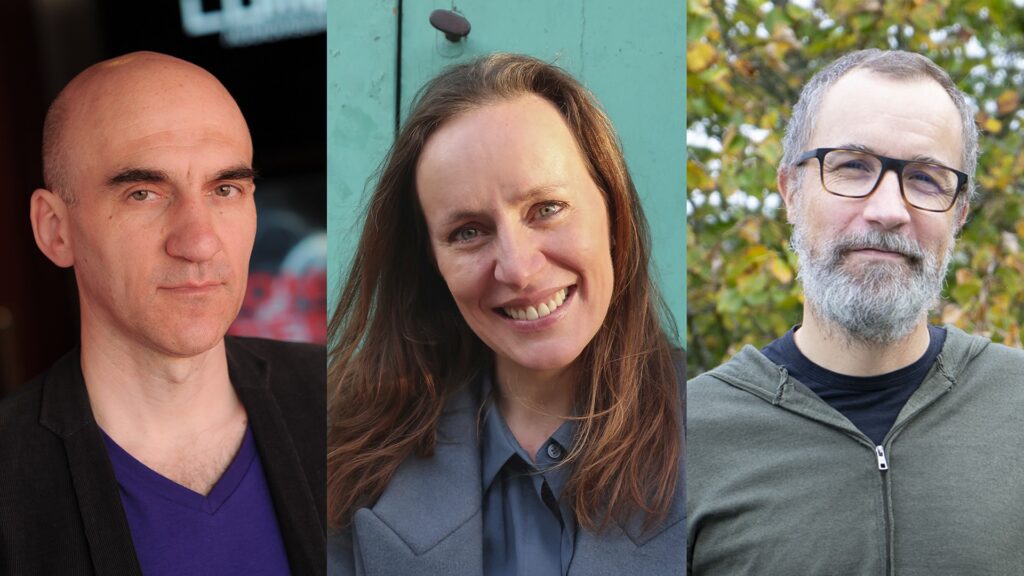The Centro Galego de Arte Contemporánea (CGAC) will host on Saturday 22 June, at 12.00 noon, the conversation Science and the contemporary condition. This activity is part of the programme of Instruments of Vision, an exhibition open from 21 June to 28 August at the Igrexa da Universidade in Santiago de Compostela.
In this meeting, which will be open to the public, will take part the artist Armin Linke, the curator of the exhibition and director of Arts at CERN, Mónica Bello, and the director of the Instituto Galego de Física de Altas Enerxías (IGFAE), Carlos Salgado, who also directed this collaborative project between the IGFAE and Arts at CERN, the art programme of the European Organization for Nuclear Research.
The conversation will address, from the diverse background of the participants, the dynamics and culture of particle physics laboratories, which are shown in Instruments of Vision. Drawing on his experiences, Armin Linke will share the diverse range of strategies employed in this and previous projects, such as Image Capital, a recent exhibition developed in collaboration between the Fondazione MAST, the Folkwang Museum and the Centre Pompidou. In this way, the artist will provide insights into how art relates to the complexities of contemporary conditions, especially regarding research communities and scientific environments.
The artistic perspective from Armin Linke (Milan, 1966) will be complemented by the role of Mónica Bello (Santiago de Compostela, 1973), who since 2015 has been leading the Arts at CERN programme, promoting the artistic initiatives of the world’s largest particle physics laboratory. And it will be completed with the presence of the director of the IGFAE, Carlos Salgado (Monforte de Lemos, 1971), a theoretical physicist specialising in the study of quantum chromodynamics, who has spent part of his scientific career at CERN.
About Instruments of Vision
IGFAE and CERN join together in ‘Instruments of Vision’, an exhibition by artist Armin Linke
Instruments of Vision brings together more than 20 years of work by the artist Armin Linke observing the research carried out in large experimental infrastructures such as CERN, the Laboratori Nazionali di Gran Sasso (L’Aquila, Italy), or the Institute for Quantum Optics and Quantum Information (IQOQI) in Innsbruck (Austria).
In addition, for this occasion, Armin Linke has produced a series of works that show the scientific work of IGFAE staff, present in some of the most important international scientific collaborations in particle physics, such as the LHCb experiment at CERN. The project commemorates, in 2024, the 25th anniversary of the creation of the IGFAE and the 70th anniversary of the founding of CERN.
About the IGFAE
The Instituto Galego de Física de Altas Enerxías (IGFAE) is a research centre created in 1999 by the University of Santiago de Compostela and the Xunta de Galicia. It was founded with the aim of coordinating and promoting scientific and technical research in the fields of High Energy, Particle and Nuclear Physics, and related areas such as Astrophysics, Medical Physics or Instrumentation. Since its inception, IGFAE staff have participated in some of the world’s largest experimental facilities, such as the Large Hadron Collider (LHC) at CERN.
The IGFAE’s scientific work and its international projection have been twice awarded as a María de Maeztu Unit of Excellence, given by the State Research Agency from Spain. It is, so far, the only Galician centre to have obtained this prestigious seal. The IGFAE also has the accreditation of excellence of the Galician Network of Research Centres, granted by the Xunta de Galicia.
For years, through the IGFAE Labs, the Institute has opened new spaces for connection with society, with the aim of promoting responsible research and innovation (RRI). In this context, the ArtLab programme, which includes Instruments of Vision, contributes to the dialogue between various contemporary artistic disciplines and particle physics.
